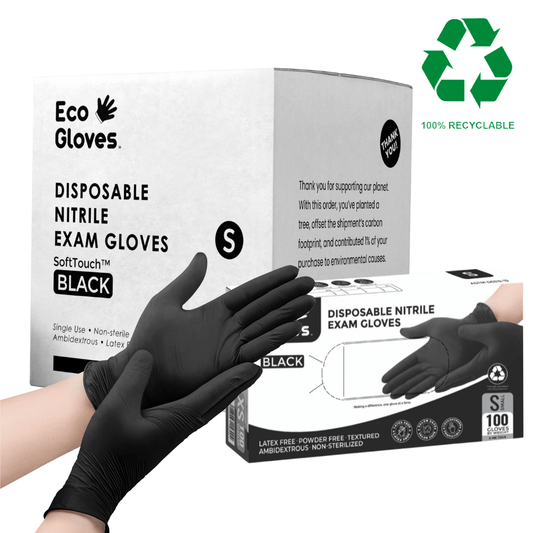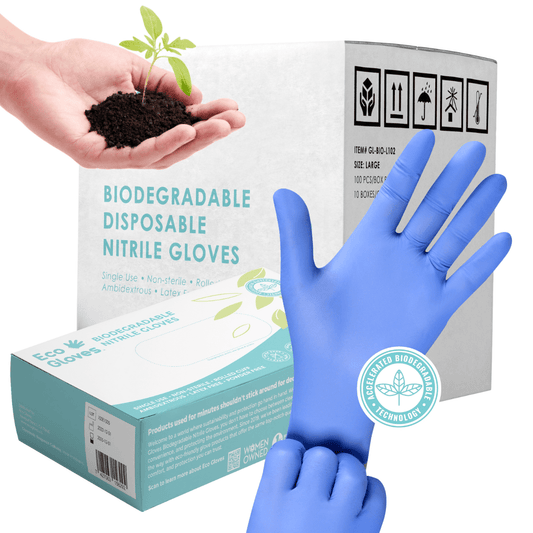What are Recyclable Gloves?
Eco Gloves
Recyclable gloves are types of gloves that can be disposed of sustainably and reused for other purposes after use. These gloves are becoming increasingly popular due to their eco-friendliness and the fact that they help reduce waste and pollution. In this article, we will explore recyclable gloves in detail and discuss their benefits, types, and recycling options.
Topics Covered
- What are recyclable gloves?
- What kinds of gloves are recyclable?
- How are recyclable gloves an environmentally friendly glove option?
- Where can recyclable gloves be recycled?
- What are the limitations of recycling disposable gloves?
- When should disposable gloves be thrown out or incinerated instead of recycled?
- What is the recycling process for disposable gloves?
- What options are available for disposable gloves recycling?
- What industries or types of tasks are recyclable gloves good for?
- Key Takeaways: Why Recyclable Gloves Matter
- Frequently Asked Questions About Recyclable Gloves
What are recyclable gloves?
Recyclable gloves are gloves that are typically made from various types of plastic or rubber materials, which can be recycled and processed into new products. Recyclable gloves help to reduce the amount of waste that ends up in landfills and can also provide valuable raw materials for the production of new products.
What kinds of gloves are recyclable?
There are several types of disposable gloves that can be recycled, including nitrile, vinyl, thermoplastic elastomer (TPE), and latex gloves.
- Nitrile gloves: Nitrile gloves are made from a synthetic rubber material that is non-toxic and non-allergenic. They are highly resistant to chemicals, punctures, and abrasions, making them a popular choice for medical and industrial applications. Nitrile gloves are recyclable and are typically processed using an extruder to create plastic granules, which can serve as a secondary raw material for new plastic products. Additionally, nitrile gloves can undergo further processing to be transformed into raw materials that are used in the manufacturing of various products, such as park benches, waste bins, flooring, playgrounds, and automotive parts.
- Vinyl gloves: Vinyl gloves are made from polyvinyl chloride (PVC) and are a cost-effective option for industries such as food service, janitorial, and cleaning. Vinyl gloves can be recycled along with other PVC products. Once collected, used vinyl material can be ground up into small pellets, which can then be melted down to create a variety of new vinyl products, including traffic cones, hoses, and cable insulation.
- TPE gloves: TPE gloves are made from thermoplastic elastomers, a type of polymer that is non-toxic and recyclable. They are an eco-friendly alternative to traditional gloves and are commonly used in the healthcare, food service, and cleaning industries. Thermoplastic elastomers are an excellent choice from an environmental standpoint because they consume less energy during production than other materials and can often be reclaimed and recycled by molding or extruding. Most thermoplastic elastomer products are also recyclable under Plastic Recycling Code 7.
- Latex gloves: Latex gloves are another type of disposable glove that is recyclable. These gloves are made from natural rubber latex and can be processed in the same way as other rubber products. Like nitrile gloves, latex gloves can be collected and sent to a recycling facility to be processed into new products. However, it's worth noting that some people may have a latex allergy, so alternative glove options may need to be provided in these cases. Additionally, due to the potential for allergies and the availability of alternative glove materials, latex gloves may not be as commonly used as nitrile or vinyl gloves in certain industries or settings.
How are recyclable gloves an environmentally friendly glove option?
Recyclable gloves are an environmentally friendly option for several reasons. Firstly, they are made from materials that can be repurposed when collected and recycled properly together, which helps to reduce waste and pollution. Secondly, some disposable gloves, such as TPE gloves, are produced using sustainable manufacturing processes that reduce energy consumption and greenhouse gas emissions. Lastly, recyclable gloves can be reused or repurposed, which reduces the need for new gloves, contributes to new streams of products, and conserves resources.
Where can recyclable gloves be recycled?
Recyclable gloves can be recycled through various programs and facilities. Recycling programs are available through waste management companies and local recycling centers. In many states and cities there are even private recycling businesses that have established recycling programs to specifically collect and recycle used gloves. One well-known private U.S.-based recycling business is TerraCycle headquartered in New Jersey. They serve and run a platform to collect many non-recyclable pre-consumer and post-consumer waste materials for repurposing into new materials.
What are the limitations of recycling disposable gloves?
It’s important to note that not all recycling facilities accept disposable gloves, and proper disposal methods should be followed if recycling is not an option.
For example, while nitrile and vinyl gloves can be recycled, they cannot be recycled with plastics, paper, or cardboard. This is because they require special treatment at the recycling facility. It's important to keep them separate from other waste, and some recycling facilities may not accept them at all. If in doubt, be sure to ask the recycling facility before dumping the gloves with other recyclables. If nitrile or vinyl gloves are mixed with other materials, it can be complicated for the recycling center to sort through the mixed recyclables, and they may end up in a landfill instead.
Overall, it's important to be aware of the recycling guidelines for each type of recyclable glove and to make sure they are properly sorted and disposed of to minimize their impact on the environment. Additionally, certain types of gloves may be better suited for certain industries or applications, so it's important to carefully consider the intended use and disposal options when choosing gloves.
When should disposable gloves be thrown out or incinerated instead of recycled?
One special circumstance where disposable gloves should be thrown in a landfill instead of going to a recycling facility is when they are contaminated with hazardous chemicals or other toxic substances. Once they are contaminated, they are considered hazardous waste and should be disposed of properly to avoid harm to the environment.
What is the recycling process for disposable gloves?
The recycling process for disposable gloves typically involves a few key steps to ensure that the materials are properly collected, sorted, and processed for reuse.
Step 1: Collect the recyclable gloves in the appropriate place for the recycling program to pick them up. This can be a designated bin or container in the workplace, or a collection point in the community for individuals to drop off their used gloves.
Step 2: Once the gloves have been collected, the recycling company will sort the materials and clean them to remove any contaminants or impurities. This ensures that the recycled material is of a high quality and can be used in the manufacture of new products.
Step 3: After the gloves have been cleaned and sorted, the recycling company will process the recycled product by turning it into materials that can be sold to product manufacturing companies. These manufacturing companies can then turn these recycled raw materials back into a wide range of products, such as laundry bottles, detergent bottles, and drinking containers.
Overall, the recycling process for disposable gloves requires a collaborative effort between consumers, businesses, and recycling facilities to ensure that the materials are properly collected and processed for reuse. By following the appropriate recycling guidelines, individuals and organizations can help to reduce waste and minimize their impact on the environment.
What options are available for disposable gloves recycling?
Basic Recycling:
The simplest way to recycle disposable gloves is through basic recycling. As long as the gloves are not contaminated, they can be placed in general recycling bins alongside other dry products. This approach is widely accessible and allows nitrile gloves to be recycled, helping to reduce the amount of waste sent to landfills.
Recycling Program Partnership:
For a more involved and comprehensive recycling option, partnering with a recycling program is a viable choice. By working with a specialist, you can ensure that your materials are being properly recycled and processed. This approach can provide greater peace of mind and a more efficient recycling process. However, it may not be as accessible as basic recycling and may require additional effort and coordination.
Biodegradable Gloves Instead of Recyclable Gloves:
In addition to recyclable gloves, there is another environmentally-friendly glove option available: biodegradable gloves. Biodegradable Gloves are made from materials that are either biodegradable and/or compostable, meaning they can break down naturally over time without harming the environment. Eco Gloves offers a line of Biodegradable Nitrile Gloves, which have been enhanced with an organic additive which accelerates the biodegradation process of nitrile gloves enabling gloves to break down faster within 1-3 years. The result is natural biomass that returns back to the earth, eliminating concerns for long-term leaching of toxic chemicals into the environment and unwanted glove waste in landfills.
In fact, one of the main benefits of using biodegradable gloves is that they do not contribute to the buildup of waste in landfills or the ocean, unlike traditional disposable gloves. Since they can break down naturally, they can also reduce the need for fossil fuels and other resources used in the production of conventional gloves. Additionally, Eco Gloves Biodegradable Gloves are free from harmful chemicals such as latex, vinyl, and nitrile, making them safer for people and the environment.
Choosing Eco Gloves Biodegradable Gloves over recyclable gloves is a personal choice that depends on individual preferences and circumstances. While recyclable gloves offer the advantage of reducing waste, biodegradable gloves can provide a more sustainable solution for those looking to minimize production and overall waste in the environment.
What industries or types of tasks are recyclable gloves good for?
Recyclable gloves are suitable for a wide range of industries and tasks. They are commonly used in healthcare, food service, janitorial, and cleaning industries. Recyclable gloves are an excellent option for tasks that require the frequent use of gloves, such as food preparation, cleaning, and medical procedures. They are also an excellent option for industries where hazardous contamination is low, since glove exposure to hazardous chemicals or other toxic substances can contaminate the whole collection of recycled items and making everything non-recyclable. Additional, recyclable gloves are an excellent choice for industries that prioritize sustainability and eco-friendliness.
In conclusion, recyclable gloves are an eco-friendly and sustainable option for individuals and industries that require the frequent use of gloves. Recyclable gloves are suitable for a wide range of industries and tasks and are an excellent choice for those looking to reduce waste and minimize their environmental impact.
Key Takeaways: Why Recyclable Gloves Matter
-
Reduce Waste in Landfills – Recyclable gloves made from nitrile, vinyl, TPE, and latex can be collected and repurposed into new products instead of ending up as waste.
-
Understand Which Gloves Are Recyclable – Nitrile, vinyl, TPE, and latex gloves can all be recycled through specialized processes and used to create items like flooring, traffic cones, or playground equipment.
-
Conserve Resources & Lower Pollution – Recycling gloves reduces the need for virgin raw materials, saves energy, and lowers greenhouse gas emissions.
-
Know the Limitations – Not all recycling centers accept disposable gloves, and contaminated gloves must be disposed of as hazardous waste.
-
Explore Recycling Programs – Partner with programs such as TerraCycle or private recycling facilities to ensure proper glove recycling.
-
Consider Biodegradable Alternatives – Eco Gloves Biodegradable Nitrile Gloves break down naturally in 1–3 years, providing an even more sustainable option.
-
Choose the Right Applications – Recyclable gloves are best for industries with frequent glove use and low contamination risks, such as food service, healthcare, cleaning, and salons.
👉 By recycling or choosing biodegradable gloves, you help minimize waste, conserve resources, and support a cleaner, more sustainable future.
Frequently Asked Questions About Recyclable Gloves
-
Are all disposable gloves recyclable?
Not all disposable gloves are recyclable. Nitrile, vinyl, TPE, and latex gloves can be recycled, but they require special handling. Contaminated gloves, especially with hazardous chemicals, must be disposed of as waste.
-
Can I put recyclable gloves in my curbside recycling bin?
Usually, no. Most curbside recycling programs do not accept disposable gloves. Check with local recycling facilities or specialized programs like TerraCycle.
-
What happens if gloves are recycled with regular plastics or paper?
They can contaminate the recycling stream, making it harder to process materials and often causing everything to be diverted to a landfill.
-
Are latex gloves a good recyclable option?
Yes, latex gloves can be recycled, but they are less widely used due to allergy concerns. Some industries prefer nitrile or vinyl alternatives.
- What’s the difference between recyclable and biodegradable gloves?
- Recyclable gloves are collected, processed, and turned into new products.
-
Biodegradable gloves are designed to naturally break down in landfills, often within 1–3 years, leaving behind non-toxic biomass.
Further Reading:
- The Ultimate Guide to Disposable Gloves: Everything You Need to Know
- The Ultimate Guide To Nitrile Gloves: Everything You Need To Know















